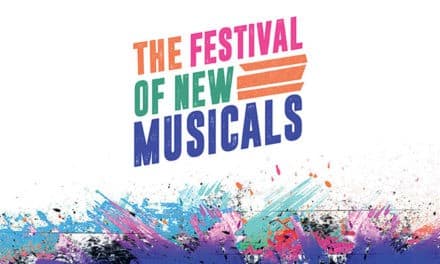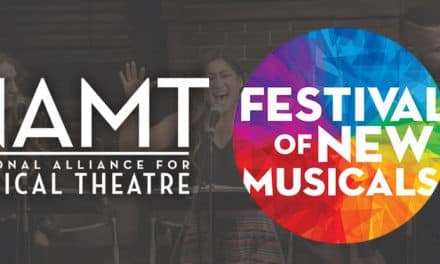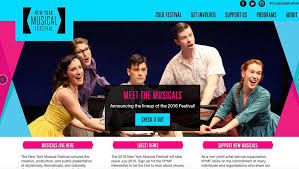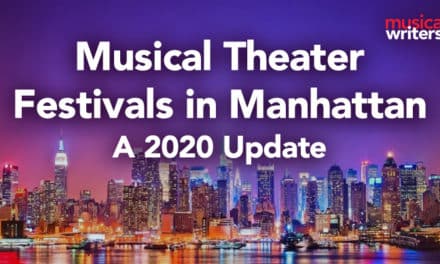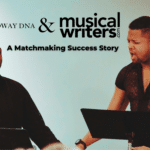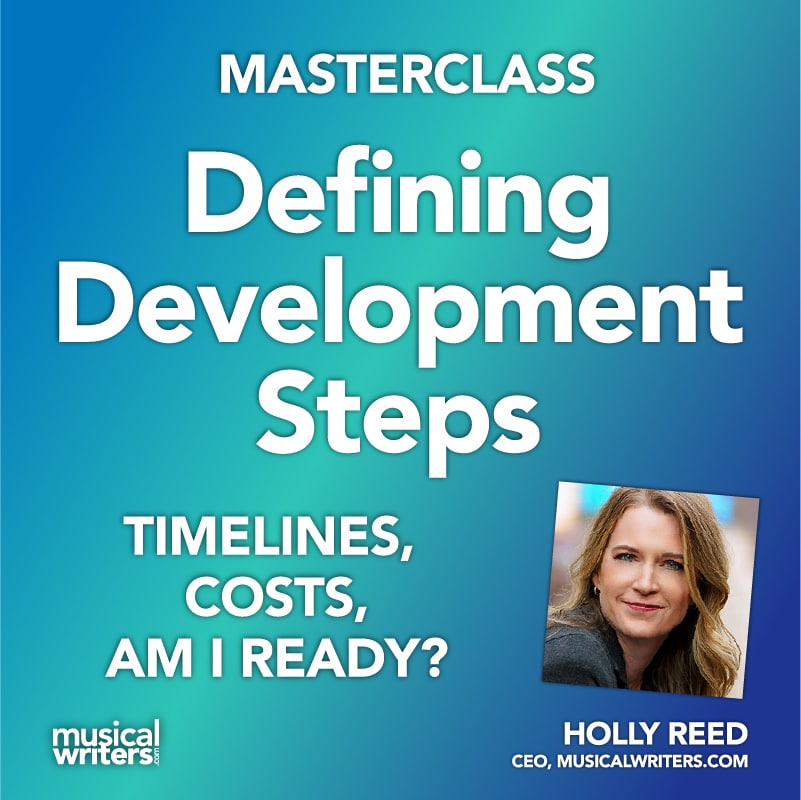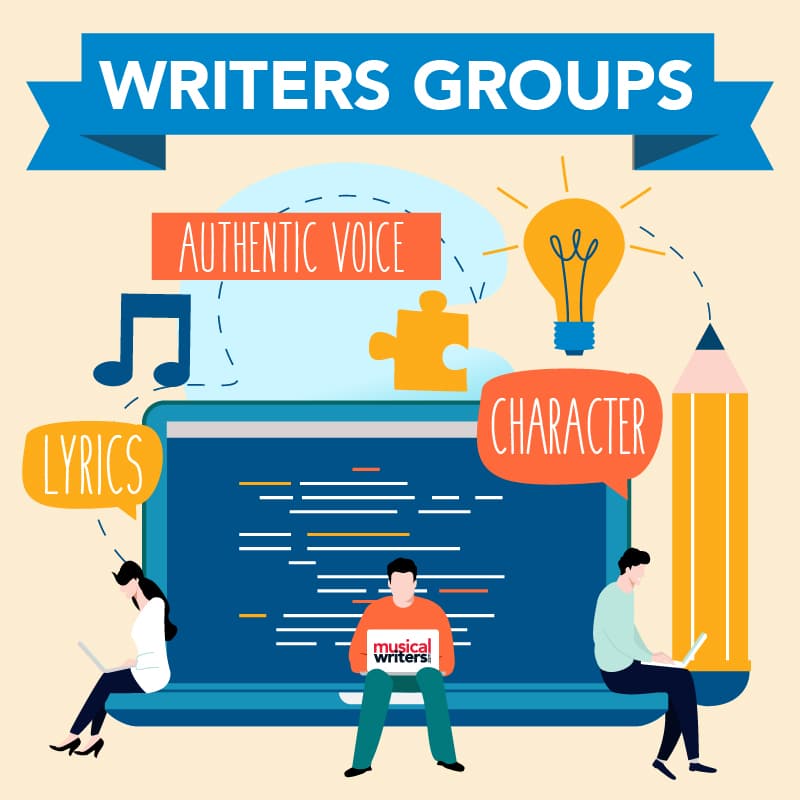Eric Sirota’s Journey
Eric Sirota, a composer, lyricist, and bookwriter, was part of MusicalWriters.com’s “Inside NYMF and Other Festivals” event in the summer of 2015. I asked him to write up his story that he briefly described at our meeting. Eric has worked the musical theatre festival scene with his new musicals and shares experiences here that we can learn from. (To read Part I with the recent experiences of two other writers, click here.)

Eric Sirota and Carol de Giere from the Summer 2015 meeting discussing musical theatre festivals.
FROM ERIC SIROTA:
I was fortunate enough to have two of my musicals (for which I wrote book, music and lyrics) in festivals this past summer. In July, my musical Day of Wrath (based on Mary Shelley’s Frankenstein) was an Official Selection of the 2015 New York Musical Theatre Festival’s (NYMF’s) Reading Series. In September, Theater for the New City presented a full production of Your Name On My Lips as part of their Dream-Up Festival.
I started going to shows at NYMF three years ago, and I especially enjoyed attending the readings. Seeing other works in early stages of development helped me as I worked on my own musicals. Generating feedback for these shows helped me improve my own.
When it comes to being able to look at new musicals critically, I definitely have to give credit to the ASCAP Musical Theater workshop readings, run by Michael Kerker with Stephen Schwartz. I have attended these workshops as an observer regularly for many years. Seeing other new pieces presented and hearing critiques by Stephen Schwartz and friends, gave me the framework to apply those comments and criticisms vicariously to my own work.
I had first conceived of Day of Wrath when, after seeing the short-lived 1981 Frankenstein play on Broadway, I heard the story sing in my head as a musical. In 1990 I had an amateur production of a very early draft, by scientists in the research lab where I still work. Skip ahead a couple of decades, having rewritten it many times, it had its first staged reading, a single performance, at the Emerging Artists Theatre – New Work Series (Paul Adams, Artistic Director) in October, 2014 (newworkseries.com). I had to bring most of the audience in myself; nevertheless the experience was an important and extremely valuable step in my development of the show, facilitating its acceptance into NYMF.
A Reading at NYMF: New York Musical Theatre Festival
NYMF (NYMF.org) readings involve three on-book, rehearsed performances of the whole show, with piano accompaniment. The audience then fills out a questionnaire. Unlike some other formats, there is no formal “talk-back” afterwards. The first two performances are on the same day, followed by a break of a couple of days and then the third performance. This leaves time to potentially make some revisions.
A few months prior to the festival, NYMF assigns a dramaturg to the project, and I had the pleasure of working with Lynn Spector. We met a few times and the discussions were very helpful. They provided enough time to rework some of the material based on her input. We also discussed what questions should be in the questionnaire. The NYMF format is to have specific questions with multiple-choice answers. It makes it easy for people to answer, and those who have more extensive or general comments write them anyway.
The total cost for doing the NYMF readings, including about $2000 in fees to NYMF, was approximately $6000. I chose to use non-equity actors, but not because of cost. I paid the performers stipends on par with the Equity guidelines. For me, the AEA rule which would have prohibited videotaping the performances was a non-starter, since it was necessary for me to have recordings for further improvement and development of the musical, as material for demos, and to show people who couldn’t attend. In addition, as non-equity, we did not have to rigorously adhere to the 29-hour readings policies.
The exceptional scheduling and organization of stage manager Daniel Ricken kept the rehearsal time for individual actors to a minimum. And even though it was only a staged reading, with a cast of 5, our director, Katharine Pettit, was able to stage entrances and exits so that only the characters in the scene were present. This meant that chairs and extra music stands were not cluttering the stage – a big plus in my opinion. In addition, we incorporated some stage actions and a few small props to reduce the amount of stage directions that needed to be read.
The performances were in the 55 seat Studio Theatre at Theatre Row on 42nd Street, where we were also given tech time. One of the advantages of NYMF, besides its high visibility, is that you don’t need to fill the seats with your own contacts. We are given up to half the seats to reserve, and NYMF handles the rest. These seats are typically reserved in advance by NYMF subscribers and members of the public; tickets are free.
As a reading, it was still very much a part of NYMF: included on their website, in their program and afforded the assistance of the NYMF staff who were incredibly helpful. Having Day of Wrath in the NYMF reading series was well worth it; and the process and the feedback were very helpful in preparing it for its next step in development, which will hopefully be a full production.
Dream-Up Festival and Midtown International Theatre Festival
My second musical theatre festival experience this past summer was having my musical Your Name On My Lips (book, music, & lyrics) presented by Theater for the New City (Crystal Field, artistic director) with 10 performances as part of their Dream-Up Festival, between Aug. 30 and Sept. 18. Your Name On My Lips has an original story, with a driving contemporary score with classical influences, about a young artist fighting to hold on to the love of his life, as the materialistic world tugs at her. www.YourNameOnMyLips.com
I already had multiple staged readings of Your Name On My Lips first at Emerging Artists Theatre, and then including one at the Midtown International Theatre Festival in 2014. Prior to those, I had participated in Carol de Giere’s Musical Writers First Act Feedback Fest with Theatre Resource Unlimited (TRU truonline.org). I owe a huge part of my progress to Bob Ost and TRU where I made connections with people throughout the theater community, including those associated with developmental theatre and these festivals.
Theater for the New City (1st Ave & 10th St.) is an old established Off-Off Broadway theatre. I was, at first, hesitant to be a self-producer in a festival without someone else with “skin in the game,” not so much because of the cost, but because I didn’t want to do a “vanity production.” (Some festivals essentially let people put on their show as part of the festival, but provide very little.) TNC was very different in this regard. We had 10 full-length performances, a tech and dress rehearsal in their 99 seat theater; festival publicity, press and ticketing infrastructure; access to a piano and props. All of this was covered by the $500 fee. In addition, the production earned 60% of the box office receipts (tickets were $20 each). The staff was also extremely helpful. This was TNC’s own festival, so the productions were billed as “Theater for the New City presents . . .”. It was clear that TNC was putting their resources and name behind this, as well, which was very important to me
Having already done several staged readings of “Your Name On My Lips” a full production allowed me to focus on outstanding issues that could now be addressed. How would the storytelling work in certain dance numbers? How to portray a fantasy character? Would certain role-doubling work? How would replacing the narration in staged readings with action, costumes, scenery and lighting affect the show? A full production also meant that we could incorporate a cello in the pit and paintings on stage, both of which are important to the plot.
There were 10 performances spread over a three week period, on all days of the week, some weekend evenings and afternoons, and others weekday evenings, so people could come regardless of their schedules. Also having it spread over 3 weeks, I had hoped to have the opportunity to make changes and improvements if some parts were not working.
I was able to keep the scenery cost reasonable, because the artwork, which was a major component of the set, was provided by my wife, the artist Cara London (www.CaraLondon.com). TNC also houses an art gallery, and Crystal Field invited Cara to have a show there, coinciding with the festival.
We used a non-equity cast and compensated them on par as if it were a “showcase” but without the constraints that using the AEA code would impose. It was wonderfully directed by Katharine Pettit, Ted Arthur (music director) and Daniel Ricken (assistant director and stage manager.) The cast and the rest of the team were excellent, and are listed on the website, where excerpts can be seen: www.YourNameOnMyLips.com
This ended up costing about $12K, but was more than worth it. I attended and recorded all the performances and gauged audience reaction. I solicited and obtained a lot of feedback, which gave me what I need to improve the work for the next production, both regarding book and music, as well as production elements.
The overall attendance was good, but not great. By having 10 performances, it gave more people the opportunity to come, but spread them out over different days. 3 shows had a packed house, 4 had a nice sized crowd, and 3 (9 PM on weekdays) were small but good audiences.
The only disappointments were more associated with publicity and marketing. Most of the purchased tickets came from people whom I had contacted, as well as those from the cast and team. The marketing done by TNC and the festival did not bring in as many people as I had hoped, nor did the additional marketing that I had paid for. Also, while I had planned to use the spread-out run to fix things by implementing changes if necessary, logistically, I was not able to do that.
Overall I am really glad I had participated in both musical theatre festivals, which really helped take each show to the next level. I got to work with wonderful talented people, learn a lot about the development and production processes, and improve both works. I’m currently looking for the next production or workshop opportunities for both of these musicals, while starting the early stages of developing my third musical, Go, My Child.


